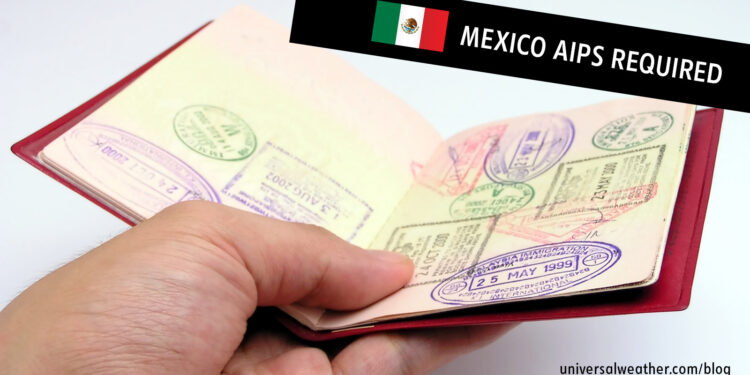Mexico APIS: Now Required for Business Aviation Flights

As of January 1, 2014, Mexico requires Advance Passenger Information System (APIS) filings for both private non-revenue and charter (non-scheduled commercial) operations. Information to submit is the same for both types of flights and is no different than existing APIS requirements for scheduled commercial operations traveling to Mexico.
The following is an overview of what you need to know:
1. Growing APIS requirements worldwide
Mexico’s adoption of APIS for General Aviation (GA) is part of a global move toward APIS reporting. China has initiated APIS requirements; the Dominican Republic is working on APIS implementation; and Russia is expected to begin requiring APIS early this year. It’s unclear, at this point, if these countries will have separate or different APIS filing requirements for GA. It’s likely that a standard APIS format, with UN edifact information, will be used for all flights. U.S. APIS requirements, in contrast, differ somewhat from the norm, in that APIS filings are not the same for private non-revenue and charter operations.
2. Initiation of Mexican APIS
On November14, 2013, the new APIS requirements were announced as mandatory for all international GA flights into and out of Mexico. It’s not clear, however, how Mexican authorities will use the collected information and what lists the information may be vetted against. It’s also unknown when new systems for APIS transmissions will be installed at all locations in Mexico. Recommended practice is to file APIS appropriately for all required flight legs in order to avoid potential penalties.
3. APIS submission process
APIS for Mexico is filed online via a 3rd-party online submission portal. From there, the information is forwarded to the Instituto Nacional de Migración (INM) – the immigration department of Mexico. No other Mexican government authorities will have access to this information.
4. Required information
APIS filings require inclusion of operator name, aircraft tail number, date of arrival/departure (in local time – not Zulu), departure point prior to entering Mexico, arrival airport in Mexico, and crew and passenger information. Note that airport formats must be in three-letter IATA codes, and the online submission portal will only allow three-letter airport identifiers. If you’re operating to/from an airport that does not have an IATA code (such as a smaller or private airport) it’s recommended to use the IATA code for the closest airport. For crew/passenger information, be sure to include full name, date of birth, country of birth, nationality, passport number with expiration date, and country of residence.
5. The system requires an airline code
Mexican APIS requirements were established with scheduled commercial operations in mind, and the system currently requires inclusion of an airline code. GA operators, both private non-revenue and charter, should enter “ZZ” in the airline code field. The airline code requirement may change over the next few months, but when this might happen is unknown.
6. Completing Mexican APIS forms
The Mexican APIS form which you file through the online submission portal is an Excel spreadsheet, and it has many validation checks in place to restrict incomplete submissions. If you enter a date of operation that’s already passed, or if you’re missing a passport expiry date, the online submission portal will not allow you to submit the form. For each submission, the portal will advise you if it’s been successfully received, and you’ll be able to view all the information submitted. If your flight cancels, you have the ability to delete a submission online. It’s important to note that you’ll need to refile the entire form each time you make a change, as information is not automatically stored online. For this reason, it’s best to save the Excel documents, on your computer, in case changes need to be submitted later. In the future, the APIS system may change – to store information, you may wish to submit for future purposes – but, for now, at least, it’s a manual system similar to CARICOM APIS.
7. When to submit and revise
Mexican law states that APIS must be submitted at least 30 minutes prior to departure. There’s no limit in terms of how far in advance APIS information may be transmitted. For Mexico, be aware that APIS may not be filed after departure/landing. Operators could face fines, and/or other enforcement measures, if APIS is not filed, or if it’s filed improperly. Please note that you will not receive confirmation that your APIS submission was accepted, but you will receive a message that it was entered into the online submission portal. Revisions are required in the event of additions to crew/passengers or change of flight to a different date. For removal of any crew/passenger, or time changes within the same date, no APIS revision is needed.
8. Third parties may submit your APIS information on your behalf
It’s permitted for 3rd-party providers, and ground handlers, to file Mexican APIS submissions on behalf of operators. In order to file Mexican APIS directly, you’ll need to contact the 3rd-party administrator of the online submission portal to set up an account for login/password and billing purposes.
Conclusion
While there was initial confusion on whether APIS transmissions were actually required for GA in Mexico, regulations clearly do mandate APIS filings for all international arrivals/departures to the country. It’s important to ensure you submit all required information and to be aware that the online submission portal will not accept blank fields or expired information. Changes and tweaks to the Mexican APIS system can be anticipated over coming months, but specifics on possible regulatory adjustments are unknown at this time.
Questions?
If you have any questions about this article or would like assistance filing your next Mexico APIS, contact us at lauraeverington@univ-wea.com or juanmuniz@univ-wea.com.




